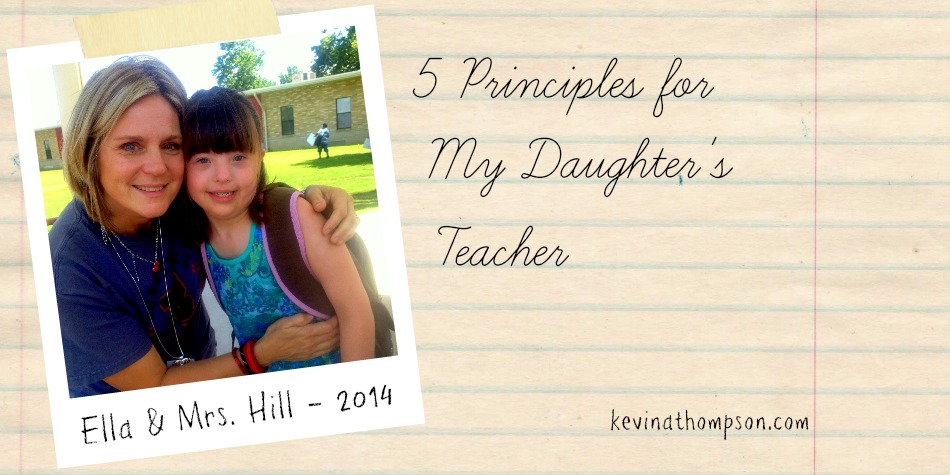For the first time in three years, Ella will have a new teacher as school starts this year. Having repeated one grade and having her teacher move up with her for another grade, the last three years have been spent with the same instructor. But this year we get to break in a new one.
Ella has Down syndrome. To learn more of her story, you can read:
What I Prayed the Night Ella Was Born
Down Syndrome Is Not My Problem
What Down Syndrome Teaches Us All
Ella on Kicking a Teacher, Telling a Knock-Knock Joke, and a Pre-dinner Prayer
In light of a new school year, here are five principles we hope Ella’s new teacher follows:
1. Don’t feel the need to be an expert about Down syndrome, but do take time to learn more. You can’t be an expert on every condition that every child in your class might exhibit. Not only is it not practical, it’s not even possible. I’ve studied Down syndrome for almost a decade and I don’t consider myself an expert. I know what Down syndrome has meant for my daughter, but I don’t know what it means for other people. You don’t need to be an expert, but I do want you to always be in a state of learning. Not only will your learning help my daughter, it will also benefit you and other students. Understanding is always a good thing and understanding can only come as you learn more about the experience of another.
2. Demand obedience, but give her time to process your commands. Down syndrome is not an excuse for rebellion. Ella is fully capable of obeying those in authority. However, it will take her more time to process what she is being told. Because of her cognitive delay, understanding takes time. To expect her to obey as quickly as everyone else is not reasonable. Make commands, but give her time. Be willing to repeat commands because her hearing is not good and on many occasions her attention is in other places. Yet do not accept willful disobedience. It’s not good for her and won’t be good for other students.
3. Be fair, but keep your expectations high. As her parents, one of our greatest struggles is defining fair expectations for Ella. We must be fair, but since no one knows the true ceiling to Ella’s ability—including Ella—we want to keep our expectations high. Assume she has the ability to learn concepts even when they are hard and she is struggling to do so. Believe a day will come in which all your hard work will pay off. Decide that this is about the big picture and not about winning the day. If you consistently work with Ella, she will be better for it. I know she isn’t like the other kids, but we don’t fully know what she can and can’t do so let’s keep our expectations high. (See: Children, Disability, and Abortion)
4. Help her, but don’t be manipulated by her. Like many kids with Ds, Ella is skilled at manipulation. She is quick to use her condition to get out of work she does not want to do. Learn the difference between manipulation and need. And also understand there will be times in which you will confuse the two. Sometimes Ella will win. That’s okay. If we are never fooled then we are not being compassionate enough, yet if we are always being fooled we are not truly doing what is best for her. Be kind, lend a hand, but make her do her work.
5. Shield her, but don’t smother her. Ella is not as mature as her classmates. Her life has challenges, many of which she may never understand. While she is quick to accept people how they are, many are not as quick to give her the same courtesy. Unfortunately, neither you nor I can protect her from all of the ways that her condition can cause her to stand out. She is old enough to begin to feel some of the pain of life. Do not smother her so that she never experiences any hurts, yet on occasion feel free to shield her. If she is lonely, it’s okay to give her extra attention. If a child is treating her unfairly, it’s okay to redirect her attention so she doesn’t see. Life is hard enough; it’s okay to protect her from some of the hurts she might experience. However, you can’t protect her from all of them so don’t feel the pressure to do so. (See: What Every Parent Should Know as Kids Go Back to School)
These are five guiding principles Jenny and I try to use with Ella and they are five principles we believe her teachers can use. But what is funny about these ideas is they aren’t just true for Ella and other kids with Down syndrome; they are also true for every kid.




5 Responses to Five Principles for My Daughter’s Teacher